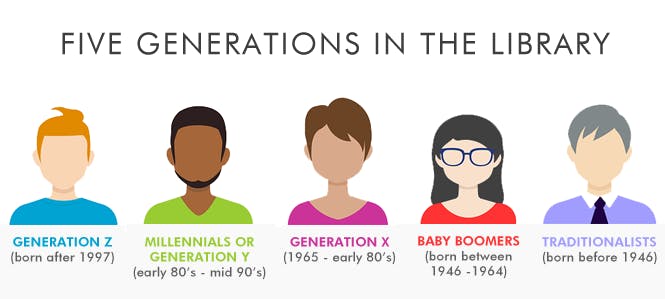 It’s been said of the LIS profession that we sometimes have a tendency to “eat our young.”
It’s been said of the LIS profession that we sometimes have a tendency to “eat our young.”
If you’ve recently launched your LIS career, you may be experiencing this. Perhaps you’ve been ignored in meetings, or had your ideas dismissed, or encountered a few too many “we don’t do it that way here” comments.
The good news? There are ways to have your voice heard. The starting point? Understanding the dynamics of the five-generation workplace.
Really? Five generations in the library?
Yes, more and more libraries are becoming five-generation workplaces, comprising demographic cohorts described as Traditionalists (born before 1946), Baby Boomers (born between 1946 and 1964), Generation X (1965 to the early 80’s), Millennials or Generation Y (early 80’s to mid 90’s) and the newcomers – Generation Z (born after 1997).
 Those five generations represent five different sets of professional expectations, life experience, world views, levels of expertise, and investment in the way “things have always been done.” The challenge for managers, then, is how to create and sustain an environment that enables individual staff members to perform at their highest (and most collaborative) levels despite these radical generational differences.
Those five generations represent five different sets of professional expectations, life experience, world views, levels of expertise, and investment in the way “things have always been done.” The challenge for managers, then, is how to create and sustain an environment that enables individual staff members to perform at their highest (and most collaborative) levels despite these radical generational differences.
Demonstrate your value above and beyond the LIS job requirements
As a new LIS professional, your challenge will be to overcome preconceived misconceptions about your skills, smarts and professionalism to be taking seriously as the strong team contributor you know you can be.
To do that you’ll need to balance two areas of expertise:
-
- You’ll want to demonstrate to your colleagues that you understand and accept the importance of “paying dues,” including respecting their knowledge and experience. Translation: first and foremost, you do an excellent job in every aspect of the position for which you’ve been hired.
- You’ll want to take every opportunity to establish yourself as an outstanding contributor above and beyond your basic job requirements after, as noted, those job requirements have been met. This can be a tricky path to navigate, but literally everyone who starts a new job (or career) has had to deal with this challenge, so no doubt you’ll succeed with flying colors!
Become an effective library team player and contributor
Smart organizations create work environments that support the concept of high-performing teams – that is, groups of librarians who are committed to achieving stated goals together by helping each other contribute at their highest levels. If you’re just starting out in your career you’re more likely to be a team member (rather than leader), which provides you with the perfect opportunity to practice being a high-value contributor by learning from the best (and sometimes worst) practices of your fellow team members and leaders. And you’ll find that there are plenty of both!
 How do you become an effective team member and contributor? Concentrate on these actions:
How do you become an effective team member and contributor? Concentrate on these actions:
- Be reliable. Being reliable may seem like a pretty boring attribute, but when it comes to your work reputation, this attribute is right at the top of the list. If you agree to accomplish something by a specific time, do it. Consistently. The ability of other team members to complete their tasks may depend on your “deliverable,” so let them know they can always count on you.
- Actively listen. Team meetings can often disintegrate into power plays, expressed as “he who interrupts the most wins the day,” also known as “I’m the important person here so I’m not going to listen to a thing anyone else says.” File this under “Worst Team Practices,” and be smart enough to realize that high-performing teams only result from mutual respect and actively listening to each other. Listen, reflect, comment, and respect others’ viewpoints – this alone will often help the older team members treat you with the same level of professionalism.
- Communicate your views honestly, then support the final decision. Your job is to contribute your best professional judgment, which at times will put you in conflict with others’ ideas. State your opinion and the rationale underlying that opinion, but understand that if you’re not in charge, your job is to implement the decision your manager has made to the best of your abilities.
- Share information. One of the most exciting changes that the younger staffers are expected to bring into the workplace with them is an eagerness to share, rather than hide, information. The mantra “information is power” has been used often as a way to compete with or undermine others; it’s equally damaging to team effectiveness. So be generous and open with the information your fellow team members need to succeed and they’ll be likely to reciprocate. They’ll also have a chance to see the value in your possibly different perspective.
- Engage and assist. Being an effective team member requires you to engage in the team’s goals, to assume mutual responsibility for their achievement, and to help other team members when necessary to accomplish those goals. (If it’s necessary to “bail out” another team member on a regular basis, then it’s time for the team leader to take another look at individual responsibilities.) But generally speaking, the goodwill and positive energy that comes from generously helping each other out when the need arises is a powerful contributor to team effectiveness and success. It’s also a terrific way to demonstrate that although you may be the youngest member of the group, you’re got the wisdom of the most seasoned practitioner.
Adopt the new LIS professional mantra
The bottom line for distinguishing yourself as a new library / information services professional pretty much comes down to these three actions:
- To paraphrase Steven Covey, seek first to understand, then apply that knowledge successfully and consistently, and only then start making suggestions for improvement
- Listen more than you talk for your first year
- Take your work seriously but not yourself – a good sense of humor will be your best career asset whether as a new professional or a seasoned practitioner
What if you’re still being sidelined?
 Marginalizing our newest professionals will harm librarians, libraries, and our future as a successful profession; it discourages and demoralizes the very individuals who need to become our next innovators, leaders, and outstanding advocates.
Marginalizing our newest professionals will harm librarians, libraries, and our future as a successful profession; it discourages and demoralizes the very individuals who need to become our next innovators, leaders, and outstanding advocates.
As Brad Rogers, LibGig’s Director of Recruiting, notes,
“It’s important that we value both the experience and expertise found among our older professionals as well as the fresh perspective those new to the profession can bring. With teamwork and leadership that strives to unite rather than divide, the two groups are complementary, not foes.”
If you’re one of those new professionals feeling like you’re being sidelined by your colleagues or manager, first make sure that you’re doing an outstanding job in your assigned role. Then seek out opportunities to volunteer on new initiatives, contribute to new programs, and suggest (and be ready to take responsibility for) new projects.
Find the coworkers who get and support you, and have them teach you how to diplomatically navigate organizational politics. Always conduct yourself professionally and responsibly, but also be willing to accept that some coworkers may always resent their younger colleagues and there’s often going to be nothing you can do about it beyond ignoring them whenever possible.
For experienced librarians working with new LIS professionals
And if you’re lucky enough to have an opportunity to work with our newest professionals?
The following tips may help you create the environment that lets them reach their highest potential:
- Coach, don’t condescend.
- Find things you can learn from them.
- Appreciate and enjoy their energy and enthusiasm.
- Look for opportunities to engage them and have them contribute.
- Understand and accept how different their worldview is, and why.
- Gently guide them toward expected professional behaviors if they’re feeling lost.
- Demonstrate a sense of humor – about them, about you, and about your work together.
Bottom line: rather than shushing our young, why not instead treat them well, expect good things from them, and help them succeed? Embracing the passion and enthusiasm of new LIS professionals while supporting their learning curve is not only a smarter – and more compassionate – approach, it’s also one likely to make for a much happier workplace.
